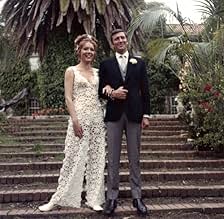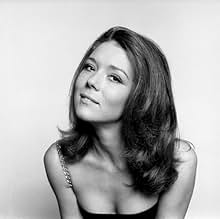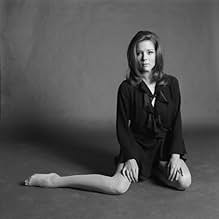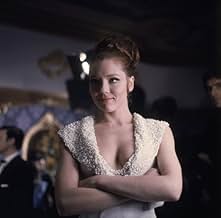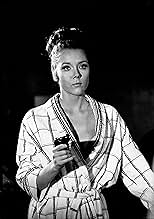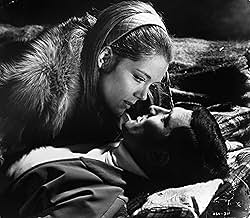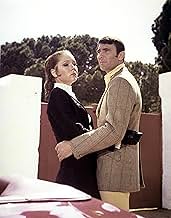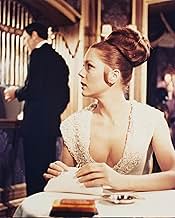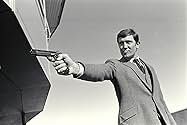James Bond recherche la fille d'un chef de mafia et s'infiltre pour découvrir la véritable raison derrière la recherche sur les allergies de Blofeld dans les Alpes suisses, qui implique les ... Tout lireJames Bond recherche la fille d'un chef de mafia et s'infiltre pour découvrir la véritable raison derrière la recherche sur les allergies de Blofeld dans les Alpes suisses, qui implique les plus belles femmes du monde.James Bond recherche la fille d'un chef de mafia et s'infiltre pour découvrir la véritable raison derrière la recherche sur les allergies de Blofeld dans les Alpes suisses, qui implique les plus belles femmes du monde.
- Director
- Writers
- Stars
- Prix
- 1 victoire et 4 nominations au total
Terence Mountain
- Raphael
- (as Terry Mountain)
Avis en vedette
After viewing "Die Another Day" recently, one thing I noticed was that the filmmakers were trying to do things a little differently. In the latest Bond, the producers and director Lee Tamahori give hit and miss results. Bond is tortured, held captive, and made to seem much more falliable than before. Halle Berry's Jinx is certainly the most active female in the series to date (save maybe Michelle Yeoh). I think the latest Bond film was overall good, and while the film scores points for trying to mix the serie s up a bit, ultimately the experiment is a hit or miss affair.
What "Die Another Day" should have modeled on was the vastly superior "On Her Majesty's Secret Service", the only Bond movie to really stray from the formula (babes, bombs, gadgets)effectively. Both "OHMSS" and "DAD" are Bond films about Bond maturing. Here, in "OHMSS", Bond matures enough to actually settle down with a woman and marry her. Diana Rigg's Tracy is that woman--probably running neck and neck with Honor Blackman (who also played Emma Peel) as Pussy Galore for the title of Best Bond Girl ever. Blofeld (played here by Telly Savalas, and not nearly as good as Donald Pleasance's Blofeld but superior in every way to the guy who played Blofeld in the awful "Diamonds Are Forever")--Bond's archnemesis--is Bond's equal in ruthlessness, as demonstrated in the shock ending. This is a key difference, for most bond villains are total buffoons.
Lastly, the key and unignorable difference in "OHMSS" is George Lazenby as Bond. He's not the best Bond ever, but after the rollicking and brutal beach fight ("This never happened to that other fella") in the opener, I accept him as Bond. Really, I only need to accept the actor as Bond, not have him be the best ever (or live up to Connery--an impossible task). In this manner, Lazenby passes.
Lazenby's performance is unique. Another post mentions that Lazenby's modeling background gave him a looser, more slinky demeanor. I wholeheartedly agree. If Connery is the Bond who is fierce and macho, Moore is Bond The Old Man, Dalton playing Bond as Shakespeare, and Brosnan's Bond as a modern Connery, then Lazenby is the only actor to really convince me that Bond is a SPY. His nimble movements are nicely balanced with blasts of ferocity, and the sublime, Hitchcockian safecracking scene really reflects this superbly. Several times in the film, Bond is forced to don disguises, something we rarely see him do. In fact, I can't think of a Bond film where the quieter "spy" moments outshine the action.
The romance is quiet too, and when Bond finally beds Tracy, it is earned rather than conquered. The score, and especially Louis Armstong's "We Have All the Time In the World" (so delightfully ironic)highlight these themes beautifully.
"Die Another Day" could have exploited differences in the Bond formula to fabulous effect, but the film really just is a string of sex, quips, gadgets and explosions (albeit above average ones). For those seeking a truly different James Bond film seek out "On Her Majesty's Secret Service". The purists should love it as well, for gadgets aside (radioactive pocket lint? c'mon Q, you can do better), the film has a great opener, a great villain, a superlative female lead (as well as a bevy of babes for Bond to be tempted by--in a Swiss chalet no less), plenty of hard hitting action (bobsled chase!), and globetrotting. "OHMSS" is easily the most effectively well rounded Bond film, second only to "Goldfinger".
P.S. For posterity, here is how I rank my top five Bond films: 1. "Goldfinger" 2. "On Her Majesty's Secret Service" 3. "GoldenEye" 4. "From Russia With Love" 5. "You Only Live Twice"
What "Die Another Day" should have modeled on was the vastly superior "On Her Majesty's Secret Service", the only Bond movie to really stray from the formula (babes, bombs, gadgets)effectively. Both "OHMSS" and "DAD" are Bond films about Bond maturing. Here, in "OHMSS", Bond matures enough to actually settle down with a woman and marry her. Diana Rigg's Tracy is that woman--probably running neck and neck with Honor Blackman (who also played Emma Peel) as Pussy Galore for the title of Best Bond Girl ever. Blofeld (played here by Telly Savalas, and not nearly as good as Donald Pleasance's Blofeld but superior in every way to the guy who played Blofeld in the awful "Diamonds Are Forever")--Bond's archnemesis--is Bond's equal in ruthlessness, as demonstrated in the shock ending. This is a key difference, for most bond villains are total buffoons.
Lastly, the key and unignorable difference in "OHMSS" is George Lazenby as Bond. He's not the best Bond ever, but after the rollicking and brutal beach fight ("This never happened to that other fella") in the opener, I accept him as Bond. Really, I only need to accept the actor as Bond, not have him be the best ever (or live up to Connery--an impossible task). In this manner, Lazenby passes.
Lazenby's performance is unique. Another post mentions that Lazenby's modeling background gave him a looser, more slinky demeanor. I wholeheartedly agree. If Connery is the Bond who is fierce and macho, Moore is Bond The Old Man, Dalton playing Bond as Shakespeare, and Brosnan's Bond as a modern Connery, then Lazenby is the only actor to really convince me that Bond is a SPY. His nimble movements are nicely balanced with blasts of ferocity, and the sublime, Hitchcockian safecracking scene really reflects this superbly. Several times in the film, Bond is forced to don disguises, something we rarely see him do. In fact, I can't think of a Bond film where the quieter "spy" moments outshine the action.
The romance is quiet too, and when Bond finally beds Tracy, it is earned rather than conquered. The score, and especially Louis Armstong's "We Have All the Time In the World" (so delightfully ironic)highlight these themes beautifully.
"Die Another Day" could have exploited differences in the Bond formula to fabulous effect, but the film really just is a string of sex, quips, gadgets and explosions (albeit above average ones). For those seeking a truly different James Bond film seek out "On Her Majesty's Secret Service". The purists should love it as well, for gadgets aside (radioactive pocket lint? c'mon Q, you can do better), the film has a great opener, a great villain, a superlative female lead (as well as a bevy of babes for Bond to be tempted by--in a Swiss chalet no less), plenty of hard hitting action (bobsled chase!), and globetrotting. "OHMSS" is easily the most effectively well rounded Bond film, second only to "Goldfinger".
P.S. For posterity, here is how I rank my top five Bond films: 1. "Goldfinger" 2. "On Her Majesty's Secret Service" 3. "GoldenEye" 4. "From Russia With Love" 5. "You Only Live Twice"
On Her Majesty's Secret Service will probably always remain the most controversial entry in the Bond series, thanks both to its unusually human and romantic story, and the notorious casting of novice actor George Lazenby as OO7. Some think these elements ruin the film, while others hail OHMSS as the best Bond ever. I wouldn't go that far in my praise, but for me this is still one of the classic Bond films, true to Ian Fleming's original vision and arguably showing OO7 in a more realistic light than any other film in the franchise.
To get the Lazenby issue out of the way first, it is certainly true to say that he lacks the charisma of the man he (temporarily) replaced, Sean Connery, and his impossibly chiselled jaw is somewhat irritating. However, he does look the part, and for a first-time actor he turns in a remarkably assured performance, particularly in the fight scenes but also in Bond's more tender moments, most notably in the highly emotional finale. If Lazenby had gone on to make more Bond films (and it was his own decision not to do so) he could well have developed into a very fine OO7, but as it is I still find his performance in OHMSS perfectly acceptable, and not damaging to the film in any way.
The film itself represented a conscious attempt to get back to Fleming after the increasingly extravagant antics of Thunderball and You Only Live Twice. Director Peter Hunt, who had edited the classic early Connery films, was very keen to remain faithful to Fleming's original story, and as a result OHMSS has an unusually strong emphasis on character and plot, with the gadgetry and humour found in most Bond films largely jettisoned. Rather like From Russia with Love, OHMSS feels like a real spy adventure, as Bond tracks Blofeld down and even adopts a disguise as he infiltrates his arch-enemy's Alpine hideaway, Piz Gloria. Where this film is unique, however, is in the level of emotion it invests in OO7's relationships with others. We see this early in the film when Bond quarrels with M and submits his resignation, a sequence which really brings out the affection which both M and Moneypenny have for him, but which M especially prefers to keep concealed. This affection is brought out again near the end during Bond and Tracy's wedding, when Q sheds his normal exasperation and shows us his fondness and respect for OO7.
However, it is of course the relationship between Bond and Tracy which gives the film its emotional heart. OHMSS sees Bond fall genuinely in love for the first and only time, and personally I found the film's romantic scenes both tender and touching, particularly for being so unexpected in a Bond film. The casting of Diana Rigg as Tracy helps immeasurably in making us believe in this romance, as she is a rare example of a proper actress taking on the role of a Bond girl, and her dynamic, spirited performance makes it easy to see why Bond would fall for her and marry her. It also helps the film's tragic conclusion, itself unique in the Bond franchise, pack far more of an emotional punch than might otherwise have been the case.
Of course, the film has more going for it than just an unusually human Bond.
Hunt directs with great skill, and the Alpine scenery that dominates the film looks absolutely stunning. There is no shortage of great action either, the highlights being a tense and gripping ski chase and an equally thrilling bobsleigh pursuit. Telly Savalas makes for a very effective Blofeld, understated and sinister, and his Rosa Klebb-like henchwoman Irma Bunt is played with relish by Ilse Steppat. There are also echoes of FRWL in the character of Draco, Tracy's father, who is a charismatic Bond ally in the style of Kerim Bey. Special mention should be given to John Barry, who produced his greatest Bond soundtrack for OHMSS. The opening instrumental theme, with its sombre and foreboding tone, sets the serious mood of the film, while the classic We Have All the Time in the World, sung by Louis Armstrong, is the perfect soundtrack to Bond and Tracy's doomed love.
However, while OHMSS is undoubtedly a classic Bond film, it just falls short of my personal top five for two principal reasons. The first of these is that the film is too long, primarily because the central section, where Bond infiltrates Piz Gloria in disguise, is dragged out for far longer than was necessary. Blofeld's plan to use beautiful women as carriers of a devastating eco-virus is the other main weakness, because it is totally preposterous and does not fit into the film's serious nature. I must admit also that, good as Lazenby is, I do wish Connery had agreed to make this film, because with him on board, and a little more editing, I think it could have been the best Bond ever, even beating FRWL. As it is, OHMSS is still a very strong film, its bold deviations from the Bond formula paying off handsomely. It is just a crying shame that it did not perform better at the Box Office, because this would encourage the Bond producers to shift to the high-camp, comic style that would dominate the franchise during the 1970s; sadly, it would be more than a decade before a serious, Flemingesque Bond would reappear on the big screen.
To get the Lazenby issue out of the way first, it is certainly true to say that he lacks the charisma of the man he (temporarily) replaced, Sean Connery, and his impossibly chiselled jaw is somewhat irritating. However, he does look the part, and for a first-time actor he turns in a remarkably assured performance, particularly in the fight scenes but also in Bond's more tender moments, most notably in the highly emotional finale. If Lazenby had gone on to make more Bond films (and it was his own decision not to do so) he could well have developed into a very fine OO7, but as it is I still find his performance in OHMSS perfectly acceptable, and not damaging to the film in any way.
The film itself represented a conscious attempt to get back to Fleming after the increasingly extravagant antics of Thunderball and You Only Live Twice. Director Peter Hunt, who had edited the classic early Connery films, was very keen to remain faithful to Fleming's original story, and as a result OHMSS has an unusually strong emphasis on character and plot, with the gadgetry and humour found in most Bond films largely jettisoned. Rather like From Russia with Love, OHMSS feels like a real spy adventure, as Bond tracks Blofeld down and even adopts a disguise as he infiltrates his arch-enemy's Alpine hideaway, Piz Gloria. Where this film is unique, however, is in the level of emotion it invests in OO7's relationships with others. We see this early in the film when Bond quarrels with M and submits his resignation, a sequence which really brings out the affection which both M and Moneypenny have for him, but which M especially prefers to keep concealed. This affection is brought out again near the end during Bond and Tracy's wedding, when Q sheds his normal exasperation and shows us his fondness and respect for OO7.
However, it is of course the relationship between Bond and Tracy which gives the film its emotional heart. OHMSS sees Bond fall genuinely in love for the first and only time, and personally I found the film's romantic scenes both tender and touching, particularly for being so unexpected in a Bond film. The casting of Diana Rigg as Tracy helps immeasurably in making us believe in this romance, as she is a rare example of a proper actress taking on the role of a Bond girl, and her dynamic, spirited performance makes it easy to see why Bond would fall for her and marry her. It also helps the film's tragic conclusion, itself unique in the Bond franchise, pack far more of an emotional punch than might otherwise have been the case.
Of course, the film has more going for it than just an unusually human Bond.
Hunt directs with great skill, and the Alpine scenery that dominates the film looks absolutely stunning. There is no shortage of great action either, the highlights being a tense and gripping ski chase and an equally thrilling bobsleigh pursuit. Telly Savalas makes for a very effective Blofeld, understated and sinister, and his Rosa Klebb-like henchwoman Irma Bunt is played with relish by Ilse Steppat. There are also echoes of FRWL in the character of Draco, Tracy's father, who is a charismatic Bond ally in the style of Kerim Bey. Special mention should be given to John Barry, who produced his greatest Bond soundtrack for OHMSS. The opening instrumental theme, with its sombre and foreboding tone, sets the serious mood of the film, while the classic We Have All the Time in the World, sung by Louis Armstrong, is the perfect soundtrack to Bond and Tracy's doomed love.
However, while OHMSS is undoubtedly a classic Bond film, it just falls short of my personal top five for two principal reasons. The first of these is that the film is too long, primarily because the central section, where Bond infiltrates Piz Gloria in disguise, is dragged out for far longer than was necessary. Blofeld's plan to use beautiful women as carriers of a devastating eco-virus is the other main weakness, because it is totally preposterous and does not fit into the film's serious nature. I must admit also that, good as Lazenby is, I do wish Connery had agreed to make this film, because with him on board, and a little more editing, I think it could have been the best Bond ever, even beating FRWL. As it is, OHMSS is still a very strong film, its bold deviations from the Bond formula paying off handsomely. It is just a crying shame that it did not perform better at the Box Office, because this would encourage the Bond producers to shift to the high-camp, comic style that would dominate the franchise during the 1970s; sadly, it would be more than a decade before a serious, Flemingesque Bond would reappear on the big screen.
Admittedly, I did not like this film at first and I can't adequately explain the reasons why. Was it because I didn't like George Lazenby, or that it distanced itself from the Sean Connery outings? On second viewing though, I was surprised at how wrong I initially was. It is not the best Bond but it is light years away from the worst. George Lazenby may be a tad inexperienced and the least charismatic of the Bonds, but he is still likable and does try hard, that I can see. And it does tone down some of the gadgetry and spectacle, however in doing that the film does boast some of the best and slickest sequences in a Bond film. The story is believable and sticks closely to the book, and the script goes into a greater psychological depth. Consequently both Bond's pursuit of Blofeld and romance with the feisty Tracy are wholly believable. Terry Savalas is great as Blofeld, and Diana Rigg is splendid as Tracy. The cinematography and scenery are beautiful, and John Barry's score and Louis Armstrong's theme song are simply terrific. In conclusion, better than I thought and dare I say underrated. 8/10 Bethany Cox
To understand the controversy behind `On Her Majesty's Secret Service,' one must understand the events so impacting the spy genre by the time of its production in 1969. After the back to back tremendous successes of `Goldfinger' and `From Russia With Love,' every hack producer and distributor rushed to make spy movies. There were serious ones (`The Spy That Came in From the Cold,' `The Ipcress File'), satirical ones (`Our Man Flint,' `The Man From U.N.C.L.E.,' `Get Smart' ), and incredibly silly ones (`The Silencers,' `Last of the Secret Agents,' `Casino Royale'). `Casino Royale' was especially damaging, since it was (VERY LOOSELY) based on a Fleming novel, and used the character of James Bond, 007. In fact, in `Casino Royale,' nearly EVERYBODY played `James Bond'. `If we don't know what we are doing, how will the enemy,' was the explanation `James Bond' (David Niven) gave to explain why MI6 was calling all its agents `James Bond'. To protect their franchise, the producers of the `real' James Bond movies emphasized in their promotion `Sean Connery IS James Bond.' In a demonstration of `gratitude,' Connery up and quit the series, leaving `On Her Majesty's Secret Service,' which was shortly to go into production, without a `Bond.'
Arguably the most ambitious and difficult to shoot of ALL the Bond films (at least to that time), it's a miracle ANYTHING works in OHMSS. Much of the time it works VERY well, though the shaky underpinnings of the first hour frequently threaten to undo it. There is so much choppy editing and dubbed dialogue, one begins to suspect he is watching a foreign film. The second hour plus works much better, all the more surprising since it was shot first. One reason may be that the film went WAY over both shooting schedule and budget, and there was enough made up `bad' press to put a great deal of pressure on the producers, first time director, Peter Hunt and star, George Lazenby. In the middle of it all, Lazenby's publicist announced that Lazenby was not going to do another Bond (Lazenby is credible when he says that announcement was not his idea. One suspects, from the bonus material, that Cubby Broccoli planted that story to discredit Lazenby, should the film fail). Add to all this the films' tacked-on, unhappy ending (planned to be the prologue for `Diamonds are Forever'), which plays completely against the humor of earlier moments, and it's a wonder the film was NOT a dismal failure. Quite the contrary, OHMSS is one of the BEST of the Bond films, filled with nonstop action, outstanding stunts, incredible sound, the best score (along with `Goldfinger') and a credible enough romance to lend it genuine poignancy. Lazenby overcame many tremendous handicaps: having to replace one of the best known and popular actors in the world; he was 28, younger than Connery when he made `Dr. No'; he was completely inexperienced as an actor (OHMSS was Lazenby's FIRST movie, not just his first starring role); his accent (thick Australian outback) and the INCREDIBLE physical demands (Lazenby did many of his own stunts). Considering all this, Lazenby is downright remarkable. Certainly, in my opinion he is better than either the snooty Timothy Dalton or the lightweight Roger Moore were in ANY of their outings as Bond.. The bonus feature on the DVD concludes with strong evidence that Lazenby became a scapegoat, despite the eventual financial success of OHMSS. Lazenby, refreshingly displays no bitterness that his career nearly ended as soon as it began. He's had a reasonably busy career playing character roles and we have OHMSS. Not a bad deal at all.
Arguably the most ambitious and difficult to shoot of ALL the Bond films (at least to that time), it's a miracle ANYTHING works in OHMSS. Much of the time it works VERY well, though the shaky underpinnings of the first hour frequently threaten to undo it. There is so much choppy editing and dubbed dialogue, one begins to suspect he is watching a foreign film. The second hour plus works much better, all the more surprising since it was shot first. One reason may be that the film went WAY over both shooting schedule and budget, and there was enough made up `bad' press to put a great deal of pressure on the producers, first time director, Peter Hunt and star, George Lazenby. In the middle of it all, Lazenby's publicist announced that Lazenby was not going to do another Bond (Lazenby is credible when he says that announcement was not his idea. One suspects, from the bonus material, that Cubby Broccoli planted that story to discredit Lazenby, should the film fail). Add to all this the films' tacked-on, unhappy ending (planned to be the prologue for `Diamonds are Forever'), which plays completely against the humor of earlier moments, and it's a wonder the film was NOT a dismal failure. Quite the contrary, OHMSS is one of the BEST of the Bond films, filled with nonstop action, outstanding stunts, incredible sound, the best score (along with `Goldfinger') and a credible enough romance to lend it genuine poignancy. Lazenby overcame many tremendous handicaps: having to replace one of the best known and popular actors in the world; he was 28, younger than Connery when he made `Dr. No'; he was completely inexperienced as an actor (OHMSS was Lazenby's FIRST movie, not just his first starring role); his accent (thick Australian outback) and the INCREDIBLE physical demands (Lazenby did many of his own stunts). Considering all this, Lazenby is downright remarkable. Certainly, in my opinion he is better than either the snooty Timothy Dalton or the lightweight Roger Moore were in ANY of their outings as Bond.. The bonus feature on the DVD concludes with strong evidence that Lazenby became a scapegoat, despite the eventual financial success of OHMSS. Lazenby, refreshingly displays no bitterness that his career nearly ended as soon as it began. He's had a reasonably busy career playing character roles and we have OHMSS. Not a bad deal at all.
This is the first and only film starring George Lazenby as James Bond 007, where he helps mobster Draco (Gabriele Ferzetti) track down arch nemesis Ernst Stavro Blofeld (Telly Savalas), where takes him to Switzerland and poses as Sir Hilary Bray to find out Blofeld's secret plan. Along the way, Bond woos Draco's daughter, Tracy (Diana Rigg).
This movie goes at a steady pace with some intriguing scenes that I've found appealing including 007 attempting to escape from Blofeld's pursuing henchman and the romantic chemistry between Bond and Tracy. Lazenby proves he is a formidable Bond that can could some serious butt, using his own moves and stunts when grappling with the henchman. This makes Bond an even more serious force to be reckoned with and an agent to fear more, in addition to his already famous license to kill.
Lazenby as Bond is a women charmer and equipped with a few one-liners and somewhat suaveness. However, his Bond has a serious and sensitive tone as evident in his emotional interaction with Tracy, who becomes one of the more unique Bond Girls, stealing Bond's heart and coming to rescue his life a few times. This makes this one of the more touching Bond movies.
The plot itself picks up speed right from the start, drags towards the middle and abruptly comes to an action-packed climax. As with many of the Bond movies, there are a lot of talk and less action, but this one lacks some suspense and humor as well. The good acting, though, counterbalances it. It's not one of the best Bonds, but overall, it's a pretty movie.
Grade B-
This movie goes at a steady pace with some intriguing scenes that I've found appealing including 007 attempting to escape from Blofeld's pursuing henchman and the romantic chemistry between Bond and Tracy. Lazenby proves he is a formidable Bond that can could some serious butt, using his own moves and stunts when grappling with the henchman. This makes Bond an even more serious force to be reckoned with and an agent to fear more, in addition to his already famous license to kill.
Lazenby as Bond is a women charmer and equipped with a few one-liners and somewhat suaveness. However, his Bond has a serious and sensitive tone as evident in his emotional interaction with Tracy, who becomes one of the more unique Bond Girls, stealing Bond's heart and coming to rescue his life a few times. This makes this one of the more touching Bond movies.
The plot itself picks up speed right from the start, drags towards the middle and abruptly comes to an action-packed climax. As with many of the Bond movies, there are a lot of talk and less action, but this one lacks some suspense and humor as well. The good acting, though, counterbalances it. It's not one of the best Bonds, but overall, it's a pretty movie.
Grade B-
Le saviez-vous
- AnecdotesSir Sean Connery originally was meant to appear in this film but opted to drop out due to the Studio Refusing to pay his $1,250,000 fee as a result Connery would be replaced by George Lazenby. however Connery was able to renegotiate with the studio and return in the next Bond film (1971)
- GaffesBond's Aston Martin's tires screech repeatedly on the loose sand of the beach. And during the later car chase, tires screech almost all the time when cornering on snow and ice.
- Citations
James Bond: [to the camera] This never happened to the other fellow.
- Générique farfeluDuring the opening credits, images are shown of Bond girls and villains. (This is the first Bond movie since Goldfinger to feature previous movies' footage in its credits.) Specifics are as follows. *First Set. *Honey Ryder from James Bond 007 contre Dr. No (1962), standing on the beach. *Dr. No from the same, in front of his underground aquarium. *Tatiana Romanova from Bons baisers de Russie (1963), messing around with her hair. *Pussy Galore from Goldfinger (1964), in the barn scene. *Second Set. *The title character from Goldfinger. *Assorted Bond girls from Goldfinger and Opération Tonnerre (1965). *The "Flaming Car Crash" scene from Thunderball. *Third set. *Emilio Largo, the main villain from Thunderball. *Aki, Kissy Suzuki, and a swordsman from On ne vit que deux fois (1967). *Blofeld's volcano lair exploding from the end of the same. Note the strategic absence of Blofeld from You Only Live Twice, due to the change of Blofeld actors.
- Autres versionsIn the French theatrical version the song "Do You Know How Christmas Trees Are Grown?" by Nina was sung by Isabelle Aubret under the title "Savez-vous ce qu'il faut au sapin de Noel?" (Do You Know what a Christmas tree needs?).
- ConnexionsEdited into The Passage (1979)
Meilleurs choix
Connectez-vous pour évaluer et surveiller les recommandations personnalisées
- How long is On Her Majesty's Secret Service?Propulsé par Alexa
- Is "On Her Majesty's Secret Service" based on a book?
- Which movie in the Bond franchise is this movie?
- Who sings the title song?
Détails
- Date de sortie
- Pays d’origine
- Site officiel
- Langues
- Aussi connu sous le nom de
- On Her Majesty's Secret Service
- Lieux de tournage
- société de production
- Consultez plus de crédits d'entreprise sur IMDbPro
Box-office
- Budget
- 7 000 000 $ US (estimation)
- Brut – États-Unis et Canada
- 22 774 493 $ US
- Brut – à l'échelle mondiale
- 22 828 813 $ US
- Durée2 heures 22 minutes
- Rapport de forme
- 2.35 : 1
Contribuer à cette page
Suggérer une modification ou ajouter du contenu manquant

Lacune principale
By what name was Au service secret de Sa Majesté (1969) officially released in India in Hindi?
Répondre






